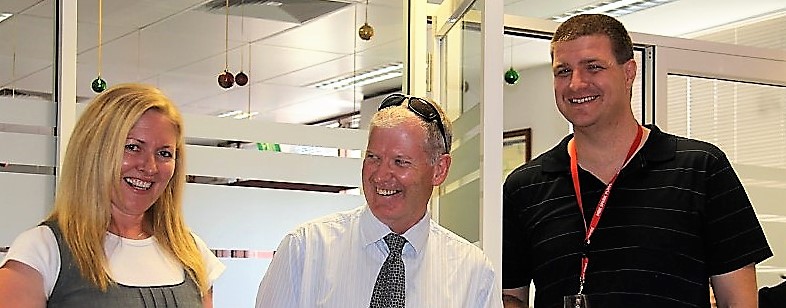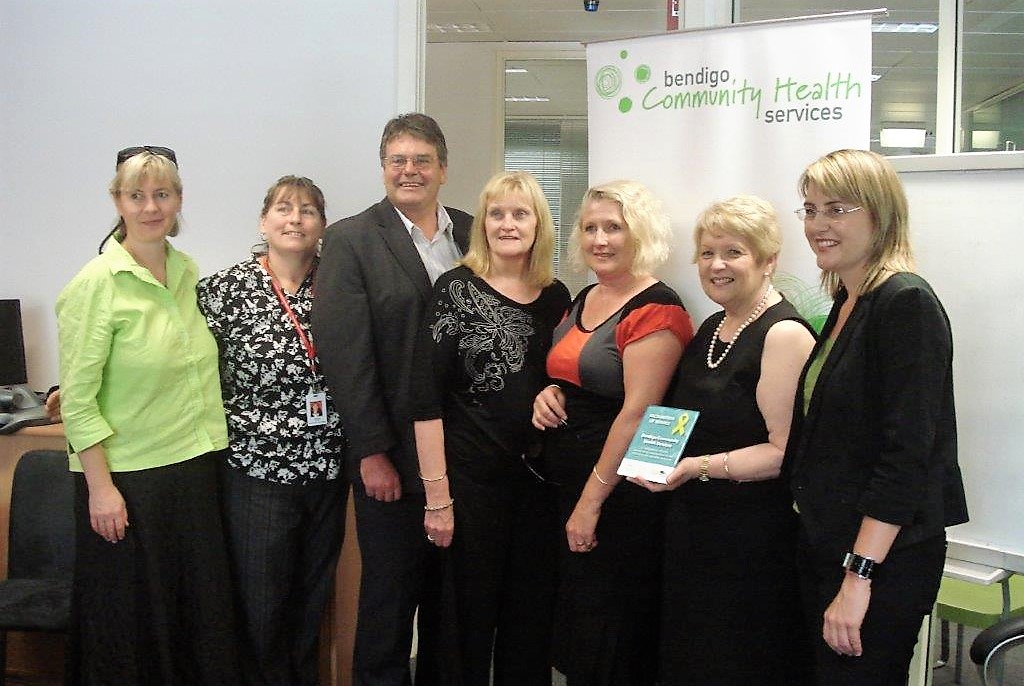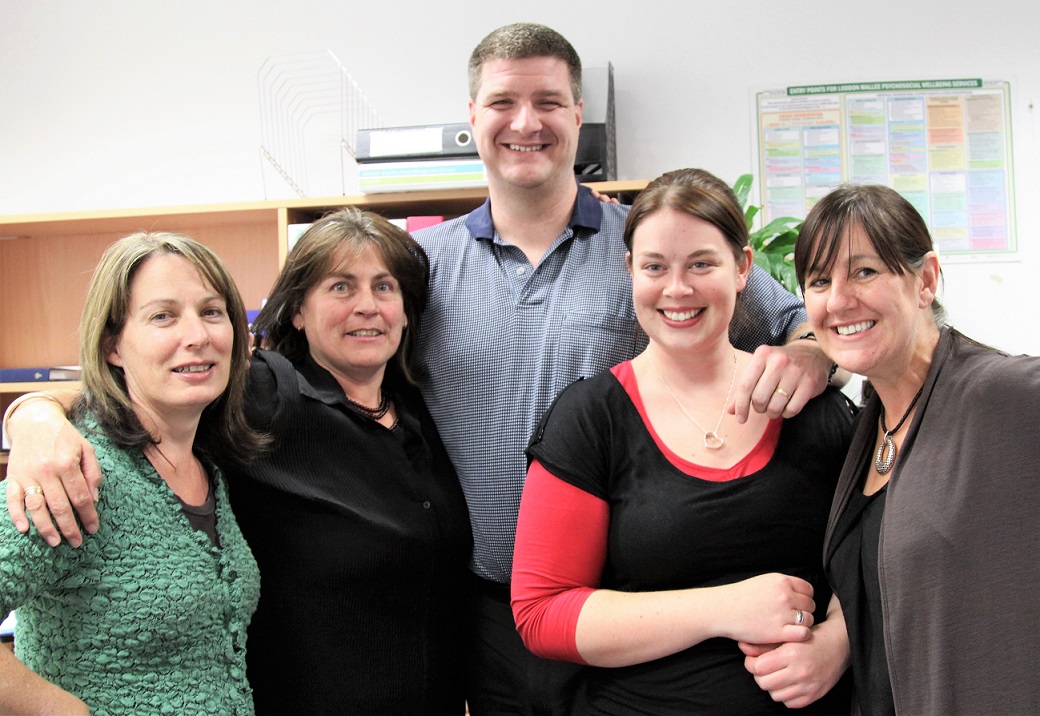Bendigo Community Health Services played a key role in the Bendigo recovery effort after the devastating Black Saturday bushfire of February 7, 2009. A dedicated team of our staff supported and cared for those most affected by the trauma of the fire as part of the State Government’s Victorian Bushfire Case Management Service established within hours of the event. As Victoria marks the 10th anniversary of Black Saturday, the staff who remain with Bendigo Community Health Services today reflect back on the time and the memories that have stuck with them through the past decade …
Kaye Graves walked into the Bendigo bushfire recovery centre on February 8 and ‘left two years later’.
Such was the enormity of the Black Saturday bushfire and the impact on Bendigo.
Kaye’s work in the recovery centre in the immediate aftermath of the fire flowed into establishing a Bendigo Community Health Service case management team to work with those most affected.
The utter shock and devastation for those that lost everything is what Kaye remembers most.
“Precious belongings lost forever and, of course, pets. Survivor’s guilt for some that they survived and others perished. Grief was palpable,” Kaye said.
“The demand was huge and initially there were few systems and resources. Initially, we helped by assisting with identity and bank cards, teeth, hearing aids, glasses, underwear.”
Kaye case managed one client.
“I cared for the woman who lost her husband and her cats … we keep in touch occasionally,” she said.
Kaye remembers the community spirit.
“I made an arrangement with dentists to do some pro bono work and got Specsavers to replace glasses using a voucher system. Blue Illusion donated masses of new clothes and we stored them at Beck Legal. My dear mother sent over two car loads of toiletries which stayed on my billiard table with family bagging them up … all hands-on deck!” she said.
Kaye remains proud of the Bendigo Community Health Services work at the time.
“The Bendigo Community Health Services response was awesome, as were our staff,” she says.
“It was a privilege to undertake this work, walk beside the devastated, influence the model of care. BCHS also developed an innovative health assessment, health coaching model funded by the Bendigo Bank which was unique and highly-regarded as stress levels remained high which has a negative physiological effect as we know. Many would access this program instead of counselling. It acted as a vehicle for engagement, too.”
Walking the streets most impacted by the bushfire to knock on doors and find people needing support who had not registered is the most vivid memory for Bronwyn Moore.
“The most intimidating experience I remember was being sent out to cold call people who had not registered with the refuge centre but it was known their homes had been right on the fire front. I went out with a young new worker. We didn’t know what we would find. I’m happy to say everyone was located and were fine. Although many of the people had been fighting the fire with garden hoses in their singlets, shorts and thongs – they talked about being thirsty no matter how much water they drank.
“None of the people who had lost their homes were defending – they were completely unaware of the danger until they had to flee for their lives. Initially, their needs were accommodation, underwear, clothing and toiletries. Necessities that we all take for granted.
“After that it was about negotiating insurance and assisting people to begin rebuilding, then after the shock subsided it was about supporting people through the grieving process.
“Some people never went back, others couldn’t wait to get back to the neighbourhood. I do believe however that the Bendigo response was critical to the recovery in Bendigo. It was rapid, intensive, personalised and demand driven.
The strength of the human spirit remains with Bronwyn today.
“The people who I saw went through many stages but all of them became stronger and none were broken by losing everything. I saw a couple of younger people (teenagers) develop an inner strength and confidence due to the roles they played during and after the fire event. I think this will stay with them forever.
“During the cold calls I met with people who had done amazing and very brave things to prevent the fire moving further into town.
“I also remember how grateful everyone was. I still have all the thank you cards and letters. It was a very rewarding but unusual experience to see people get back on their feet and get on with their lives in such a short time.”

TEAM EFFORT: Bronwyn Moore, Peter Richardson and Steve Hart.
Case manager Deb Wade still feels the honour and privilege of helping people in a time of dire need.
“I just remember the sheer devastation and loss of life but also the out pouring of generosity and spirit of the community to give and support their fellow Victorians and Australians who were impacted,” she said.
“Many of the people who were affected were not typical service users prior to the fires and it was very difficult at times for them to accept support, particularly around their emotional and psychological needs. This was an unprecedented and life changing event that put a lot of people in the spotlight for all the wrong reasons – grief and loss.
“There were those who just wanted to move on with their lives as quickly as possible, others required significant support and a few who were defined by this event. The healing process was different for everyone and you could not assume anything as everyone’s journey was different and depending on their life experiences and challenges before the fires.”
Present acting CEO Peter Richardson was working with the Department of Human Services at the time of the bushfire as the Team Quality Manager assisting Bendigo agencies to provide case management services to those most affected.
The horror stories from those caught in the path of the bushfires and the actions they had to take to survive has stayed with Peter through the years.
“People needed to grieve and begin their journey towards healing from the emotional and psychological impacts caused as a result of the devastation and deaths as a result of the fires. The material needs were certainly important to be addressed and quickly, but I don’t believe that was the most significant need,” Peter said.
“Looking back I feel a real sense of privilege and honour to have joined with other local workers and survivors and to have been a part of the recovery that needed to happen and still is happening. The whole experience was so completely devastating and will remain with me forever.”
Martine Street was at the forefront of the immediate recovery effort case managing clients and attending working groups with City of Greater Bendigo, Department of Human Services and Centrelink.
“Health issues started to become apparent as people had time to stop and process what had happened. After the initial shock and focus on tasks to secure accommodation, clothes and food, some people began to experience sleep disturbance, depression and anxiety,” Martine said.
Stories from people highlighting the shock and ferocity of the fire remain with Martine.
“People who had settled down for the day to watch a movie or the tennis with the blinds closed and the air conditioner on. They had not realised there was a fire in Bendigo until police were knocking at the door telling them to evacuate because of fire at the back fence. Or escaping the fire in a car with low visibility and the driver hearing sounds as the car hits things,” Martine said.
“The ‘big picture memory’ was the overwhelming support from Australians, in particular Victorians and the then Brumby Government who swung into action to put a great recovery response in place. Bendigo Community Health Services worked with Haven Housing Support Service and Department of Human Services as ‘one’ response system with the same objectives. It was an amazing experience to be part of and great partnerships and history was created.
“I feel proud to have been part of supporting the staff who made of the recovery team. They were great. Their energy, intelligence, flexibility, common sense approach and the freedom provided by the CEO at the time to do the work was a highlight in my time working in BCHS. I don’t think we will experience a response like this to a significant disaster like this ever again.”
As a resident living in ‘the bush’ near Bendigo February 7, 2009, will forever remain with Martine.
“I will never forget Black Saturday. Going out that day to check for smoke and feeling the heat evaporate the liquid in my eyes and suck the breath from my chest. We were following the fires on ABC that had broken out in Kilmore and were spreading fast across the state, then the fear when we heard there was fire in Bendigo. This reflection is offset by the knowledge of knowing that people deliberately made a decision to light fires in those conditions and the catastrophic consequences that are still felt today by many people,” she said.
The need for ongoing support for those most affected by Black Saturday saw Mary-Anne Richardson join the Victorian Bushfire Case Management team several months after the fires.
“My role was to work with individuals and families affected by the fires. Together we would establish what was the most important needs for that person or family and then I would help them navigate the systems in place to access those things,” Mary-Anne recalls.
“A lot of the role was advocating for the clients and playing a bit of a detective to work out where and from who you could access support, Firstly, you’d find out what the client needed and then try to work out how to get it and that usually meant making lots of phone calls to different organisations or individuals to work out who could help meet that need. It could be anything from hay for horses, bikes, scholarships for school or pet minding.
Mary-Anne says sadness and frustration were the dominate emotions months after the fire.
“People were tired, stressed and feeling worn down by the processes and grieving for the loss of their previous life,” she said.
“Replacing essential items was important but the long-term psychological impact was huge. I think the extent of that sense of loss and the endless need for people to continuously battle on (they couldn’t just step out of their current life circumstances) was unmeasurable.”
Mary-Anne looks back on helping those in dire need as rewarding work.
“It highlighted how important a community is and that Bendigo is a very generous and supportive community. It was very humbling to have the opportunity to work with individuals and families during such a devastating and vulnerable time in their lives,” she says.

AWARD: The Bendigo Community Health Services recovery work was recognised with a state recognition of service award.
Bendigo Community Health Services staff Jennifer Hurrell and Leah Wastell joined the recovery effort long after the fire – a sign of the ongoing struggle many families faced in coming to terms with Black Saturday.
Together they created a Kitchen Garden experience to engage children with ‘picky’ eating habits who had experienced the bushfire as a means of helping their recovery.
“Many children had food issues after the fire – I suspect that not being in their normal routines and not in their own environment meant that they found that food was the one thing they had the ability to control,” Jennifer said.
“The cooking was a beautiful way to address this.
“One family saw an immediate change in the worry and arguments about food and meal time after only one appointment, with their children expressing a desire to cook and help with shopping, even cooking mum breakfast in the same week as the first session.
“One family member asked on pick up what the kids have cooked and when informed it was Zucchini Slice, they commented: ‘Oh, she won’t eat that’. “We were able to respond: ‘Well, I think she will, because that is her third piece’.”
“The last session, where children cooked for their families, and everyone ate together, was a lovely way of finishing things off, and also rebuilding community.”
Jennifer said there were key learnings from the youth project especially the importance of engaging young people earlier with targeted assessment and supports such as specialist adolescent clinicians and workers to meet their needs.
“It was challenging and the needs of the clients in each project really varied, but it was also an incredible honour to be able to work on recovery and renewal with the people most impacted upon by the Black Saturday fires,” Jennifer said.
For Leah the level of trauma still experienced by families and children several years after the fire is the strongest memory from her work.
“It was a horrendous day for not only Bendigo but Victoria,” she says.
One we hope to never see again!
Bendigo Bushfire Memorial details
The City of Greater Bendigo will host Black Saturday 10 year anniversary event on Saturday, February 9, at the Bendigo Bushfire Memorial.
The event in Albert Richardson Reserve, Victoria Hill, will run from 10am to 11.30am with an opportunity to reflect through music, memories and morning tea.
Everyone is welcome.
